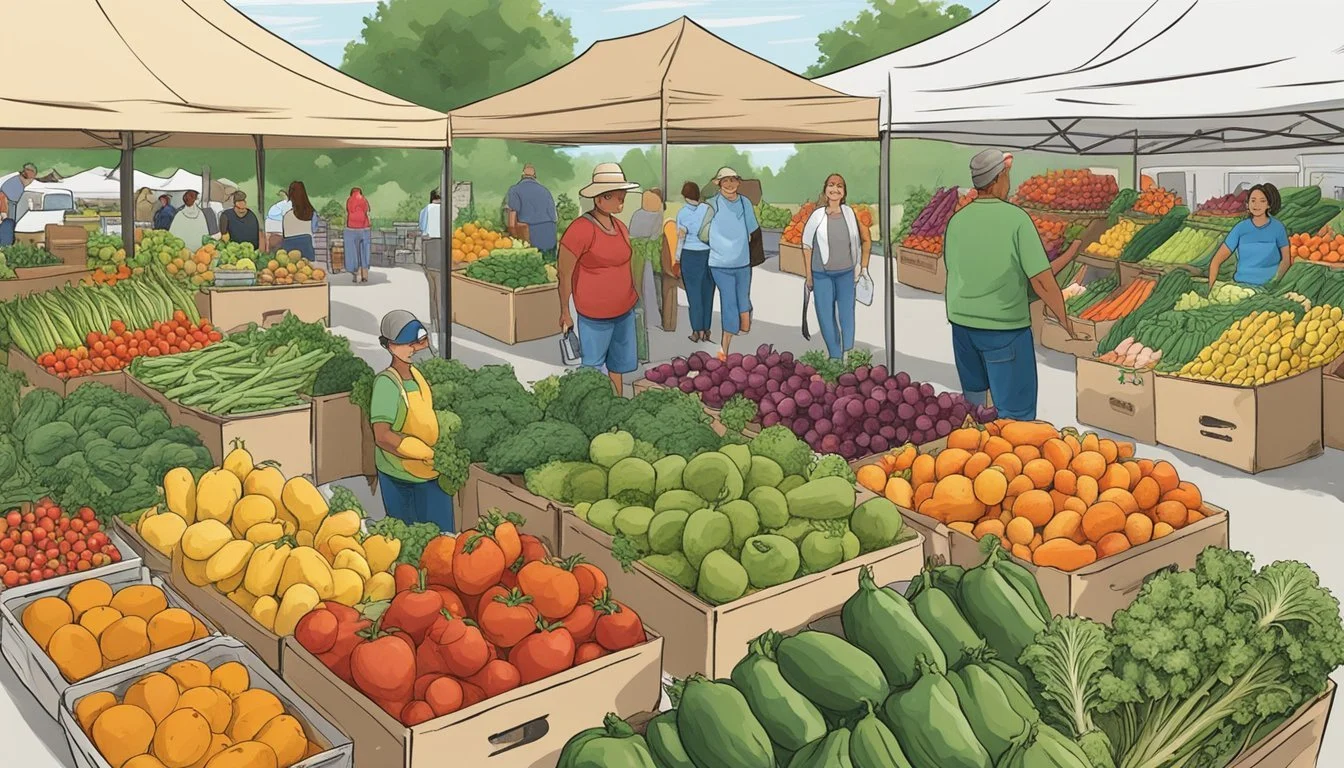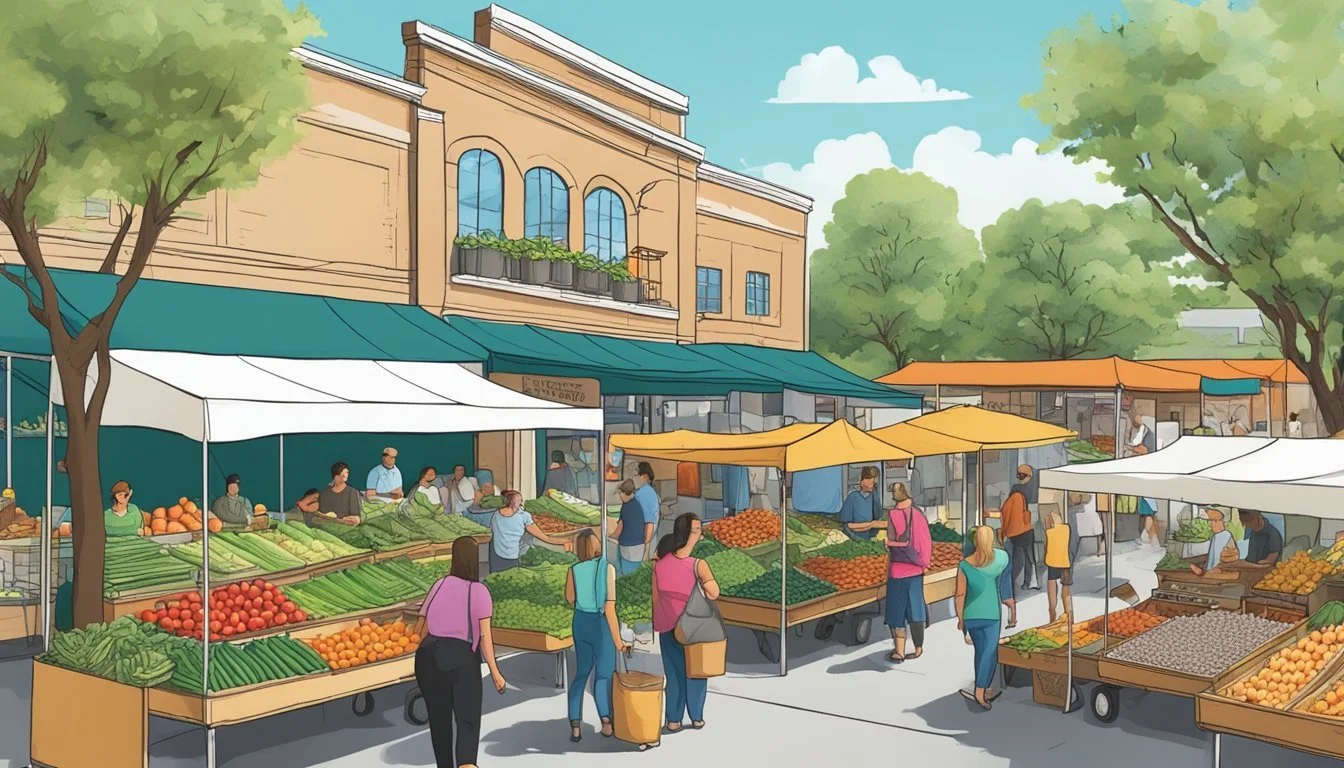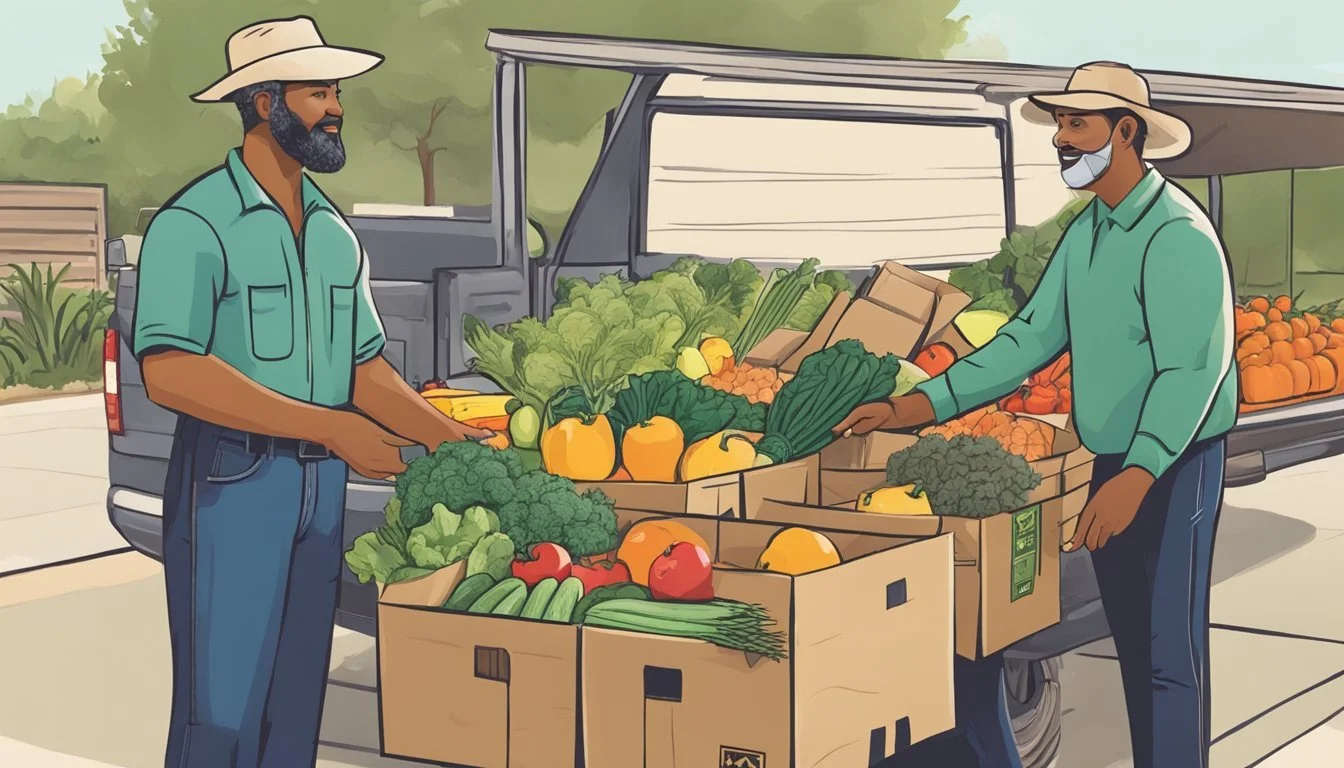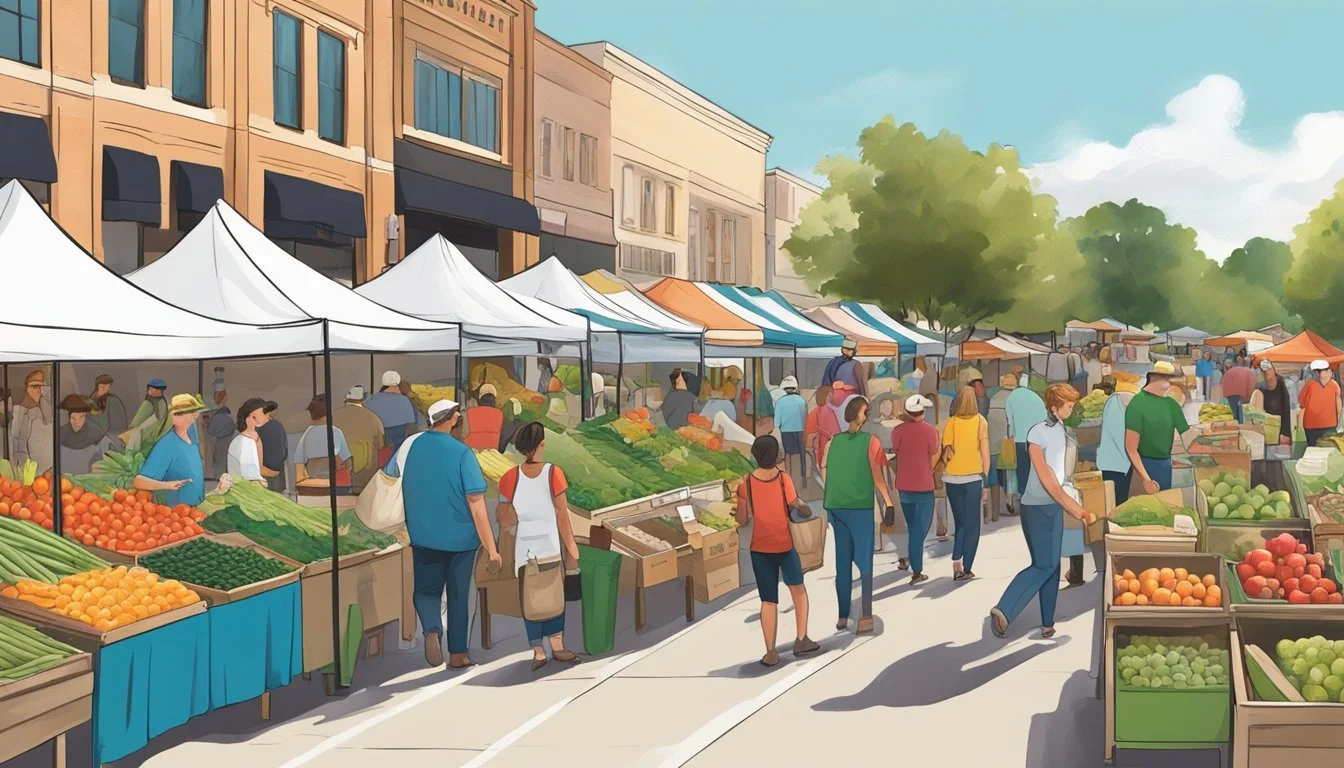Community Supported Agriculture (CSA) in Round Rock, TX
A Guide to Local Produce Partnerships
Community Supported Agriculture (CSA) is a flourishing approach to local food distribution in Round Rock, Texas. By establishing a direct link between farmers and the community, CSAs allow residents to subscribe and receive seasonal produce, thus investing in local agriculture and securing a share of the harvest. This model benefits both producers and consumers; farmers gain upfront payment and a guaranteed market for their crops, while subscribers enjoy fresh, locally-sourced food.
Round Rock's proximity to numerous farms enables a vibrant CSA scene. The area is home to several farms that offer CSA memberships, connecting consumers with a variety of fresh options such as organic vegetables, grass-fed meat, and pastured poultry and eggs. These farms, including the likes of Blessing Falls Family Farm, have made it possible to support sustainable practices and foster community engagement through seasonal food sharing.
With CSA programs, Round Rock residents have the opportunity to participate in a food system that prioritizes community welfare, environmental health, and economic viability. These programs also offer a way for consumers to learn more about where their food comes from and the methods used to grow it. Subscribers can often meet the farmers and visit the farms, thereby establishing a transparent and trust-filled relationship with the people who grow their food.
Understanding CSA
Community Supported Agriculture represents a pivotal model in local food economies, enabling direct connections between producers and consumers. It reinforces sustainability, fosters community ties, and provides members with a share of the harvest throughout the growing season.
CSA Definition
CSA, or Community Supported Agriculture, constitutes a subscription-based model where individuals or families receive regular shares of produce from a local farm. It's an agreement wherein members pay for a season's worth of produce upfront, which in turn offers farmers early operating capital. This model is emblematic of an eco-conscious mentality, with many CSAs practicing organic farming methods.
The Role of CSA in Local Agriculture
In local agriculture, CSAs play a fundamental role by boosting the local economy and ensuring farmers a predictable market. This synergy creates a resilient local food system and community, as consumers become stakeholders in the farm's harvest, and farmers enjoy the security of a committed customer base.
CSA Membership Basics
A CSA membership involves subscribing to the harvest of a regional farm, often organic, with the option of receiving a diversity of products. These could include vegetables, fruits, herbs, and occasionally additional items like eggs or honey. The subscription is typically organized into weekly or bi-weekly shares that one can pick up at designated locations. Members may also have the privilege to visit the farm, participate in events, and form a closer bond with the source of their food.
Benefits of CSA
Community Supported Agriculture offers distinct advantages to consumers and farmers, while reinforcing eco-friendly practices.
Benefits for Consumers
Consumers gain access to healthy, fresh produce that is often harvested at the peak of its season, ensuring maximum flavor and nutritional value. They forge a direct connection with their food source, supporting local food systems and securing a subscription to a steady supply of seasonal fruits and vegetables.
Health: Eating CSA procured food can contribute to a healthier diet rich in essential nutrients.
Families: CSAs can foster community and family engagement, offering educational opportunities about sustainable agriculture.
Advantages for Farmers
Farmers benefit from a CSA model through financial support in the form of pre-season capital from member subscriptions. This arrangement can result in improved farm income stability and allow farmers to focus on quality, sustainable farming practices without the concerns of unsold produce.
Subscription: Upfront payment for seasonal shares provides farmers with immediate working capital.
Local Economy: Keeps the local agricultural economy healthy by ensuring farmers are compensated fairly.
Environmental Impact
CSAs inherently support sustainable and responsible farming practices that are less taxing on the environment. By emphasizing local production, CSAs reduce the carbon footprint associated with long-distance transportation of food.
Reduced Waste: Precise planning and a direct consumer connection minimize food waste.
Biodiversity: CSAs often grow a wider array of crops, which promotes agricultural biodiversity.
CSA Operations in Round Rock, TX
Community Supported Agriculture (CSA) in Round Rock, TX, involves several local farms providing fresh, local produce to the community through subscription-based services. This system supports local farmers and fosters a closer connection between consumers and the source of their food.
Local CSA Farms
Isle Acre Farms: Situated in Leander, TX, just a short drive from Round Rock, offers chemical-free, hand-grown seasonal vegetables. It also hosts educational classes and events.
Blessing Falls Family Farm: Operates in the central Texas area and provides a variety of organic vegetables, grass-fed beef, pastured pork, poultry, and eggs to Round Rock and its surroundings.
New Leaf Agriculture: While specific details were not provided in the search results, this farm may contribute to the local CSA landscape in the Round Rock area.
Subscription Process
Consumers typically subscribe to a CSA by paying a seasonal or annual fee, which entitles them to a share of the harvest throughout the farming season. This share is often distributed weekly and can be picked up at various locations or delivered depending on the farm's offerings. Prospective members are advised to directly contact the farms for the most accurate and up-to-date subscription information.
Community Involvement
CSAs in Round Rock encourage community engagement beyond the exchange of produce. They offer opportunities for education on sustainable practices and engage locals at events such as farm tours and farmers markets.
Farmers Market Presence: Farm participants often sell produce at local farmers markets, allowing non-subscribers to purchase fresh goods and learn about the CSA model.
Educational Outreach: Farms like Isle Acre Farms provide classes, enhancing community knowledge on gardening and food production.
Local CSA operations play a crucial role in maintaining a sustainable food system in Round Rock, bringing fresh produce and agricultural education to the forefront of the community.
CSA Products
Community Supported Agriculture in Round Rock, TX, caters to a diverse range of fresh farm products throughout the year, with an emphasis on sustainability and organic options.
Typical Offerings by Season
Spring:
Vegetables: kale, chard, cilantro
Fruit: availability based on local harvests
Summer:
Vegetables: an array of seasonal produce including a variety of leafy greens and root vegetables like turnips
Fruit: a selection of seasonal fruits
Fall:
Vegetables: hearty staple veggies suited to cooler weather
Fruit: late-season varieties
Winter:
Vegetables: limited selection due to cooler temperatures, with a focus on winter-hardy varieties
Organic and Sustainable Options
Meats:
Chicken: often available from CSA farms, prioritizing humane and natural growing practices
Eggs: from free-range chickens
Beef: grass-fed options are a sustainable choice
Pastured Pork: an offering from farms focused on ethical animal husbandry
Produce:
Organic Vegetables and Fruits: grown without synthetic pesticides, focusing on natural methods
Herbs: including cilantro, grown organically
All year-round, CSA participants can expect to receive products that are fresh, local, and grown with a commitment to high-quality, sustainable farming practices.
Financial Aspects of CSA
Community Supported Agriculture (CSA) presents a unique financial model that revolves around mutual commitment between consumers and producers. This model impacts not just payment and income, but also contributes economically to local communities.
Cost and Payment Structures
CSA members usually pay up front for a share of the harvest, which can alleviate financial pressure for farmers at the start of the season. Payment plans vary, with some farms allowing installment payments while others require full payment upfront. Alternative payment options, such as Electronic Benefit Transfer (EBT) and Supplemental Nutrition Assistance Program (SNAP), are increasingly accepted, broadening access to fresh produce for lower-income households.
Typical Payment Options:
Full payment upfront
Installment payments
EBT/SNAP benefits (where accepted)
Economic Benefits for Local Communities
CSAs support local economies by ensuring income remains within the community, benefiting small businesses and contributing to the livelihood of local farmers. By direct selling to consumers, farmers often receive a better price for their produce, compared to wholesale selling. This model can also stimulate job creation in rural areas, thus sustaining the local agricultural economy.
Economic Impacts:
Money circulates within the local community
Higher income for farmers through direct sales
Potential for job growth in local agriculture
CSA and Public Outreach
Community Supported Agriculture (CSA) in Round Rock, Texas actively engages in public outreach through educational initiatives and community partnerships. These efforts highlight the importance of local food systems and the shared responsibility of farmers and consumers in sustaining agricultural practices.
Educational Programs and Events
CSA farms in the Round Rock area place a strong emphasis on education by hosting events and programs. Isle Acre Farms is known for offering a variety of classes for both children and adults, covering topics such as gardening and sustainable food production. These activities aim to deepen community members' understanding of where their food comes from and the significance of supporting local agriculture. Events like farm tours and group activities foster a direct connection between consumers and the food on their tables.
Partnerships and Collaborations
CSA farms often create partnerships that extend beyond the immediate farming community. Collaborative efforts with entities like the CSA Innovation Network enhance the possibilities for research and the development of new methods in community farming. By partnering with local farmers markets in Austin, CSAs can expand their reach, providing a broader community with access to fresh, seasonal produce. These collaborations also offer a platform for shared knowledge and the combination of resources, which further the goals of the CSA movement towards a resilient local food system.
Challenges Facing CSA
As Community Supported Agriculture continues to evolve in Round Rock, TX, various obstacles arise that challenge its sustainability. One must take into account the logistical hurdles and the impact of market dynamics to truly understand the barriers these local food systems face.
Logistical Considerations
Delivery: One major logistical challenge for CSAs is the distribution of produce to shareholders. The process involves organizing efficient delivery routes that can often become complex due to traffic, distance, and coordination with members' schedules. Ensuring fresh delivery throughout the growing season demands careful planning and adaptability to weather-related disruptions.
Water Management: Water is a vital resource for agriculture, but its availability and regulations can pose challenges. Efficient water management systems are crucial for CSAs to provide a diverse range of produce while contending with unpredictable weather patterns, especially during critical growing season phases.
Market Competition and Growth
Diverse Offerings: To attract and retain members, CSAs in Round Rock must provide a diverse array of produce, which requires a broad spectrum of seeds and knowledge of local growing conditions. Balancing consumer expectations with what can be sustainably grown is an ongoing challenge.
Competition: As CSAs seek to expand, they face competition from traditional grocery stores and other direct-to-consumer models like farmers' markets or online subscription services. They must differentiate themselves by highlighting the quality, locality, and community connection of their offerings.
Growth Management: While expansion can be positive, managing growth sustainably without compromising the quality or the values of CSA models is essential. Maintaining strong relationships with existing members while reaching new ones requires strategic marketing and community engagement.
CSA Success Stories
Community Supported Agriculture (CSA) programs in Round Rock, Texas, have showcased innovative approaches and strong case studies affirming their viability and positive impact on both farmers and consumers.
Case Studies from Round Rock
Tecolote Farm, one of the longest-running CSAs in Texas, provides an excellent case study for CSA success in the Round Rock area. The owners, David Pitre and Katie Kraemer, have provided their community with a wide variety of organic vegetables since 1994. Their commitment to ecological farming methods and community engagement has successfully fostered a loyal customer base.
Another notable CSA is New Leaf Agriculture, which is part of the Multicultural Refugee Coalition. It offers a CSA model that is as socially innovative as it is agriculturally. Under the guidance of Finegan Ferreboeuf, New Leaf takes an integrative approach, providing refugees with farming opportunities, thereby supporting both local food needs and social integration.
Innovative CSA Models
Within Round Rock's burgeoning local food scene, CSA programs stand out by adopting innovative structures that extend beyond traditional models. For example, Isle Acre Farms in Leander has expanded the CSA concept by incorporating educational classes and events, which strengthens community ties and promotes sustainability.
Additionally, the contributions of individuals such as Jason Gold, who runs BIOfarm, embody the drive towards ingenuity in CSAs. His approach involves a focus on biodiversity and permaculture principles, weaving environmental stewardship directly into the CSA model.
CSAs in Round Rock are more than just food providers. They serve as hubs of innovation and community building, demonstrating the multifaceted benefits of supporting local agriculture.
Future of CSA
Community Supported Agriculture (CSA) in Round Rock, TX, is positioned to evolve with growing consumer interest in healthy produce and sustainable farming practices.
Trends in Community Supported Agriculture
CSAs have seen a steady increase in popularity due to their model of connecting local farms directly with consumers. In Round Rock, consumers are increasingly seeking fresh, chemical-free vegetables, which CSAs like Isle Acre Farms offer. There is a growing interest in supporting agriculture that is both sustainable and community-based. Moreover, CSA innovation networks are burgeoning, facilitating knowledge sharing and best practices amongst farmers. Innovation includes diversification of offerings, such as the inclusion of eggs and chickens into CSA shares, reflecting consumer desires for a wider range of local, farm-fresh products.
Potential for Expansion in the CSA Model
The potential for CSA growth in the Round Rock area is considerable. The city's proximity to multiple farming communities enables the CSA model to support a broader distribution of farm products, including seasonal produce, meat, and dairy. Additionally, organizations like Good Apple are indicative of a broader movement towards integrating CSA operations with social goals, such as tackling food insecurities in local communities. This expansion could also spur the development of more vegetable-growing classes and farm-related events that traditionally accompany CSA activity, fostering deeper connections between producers and consumers.








